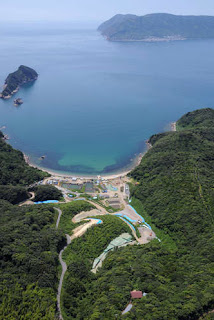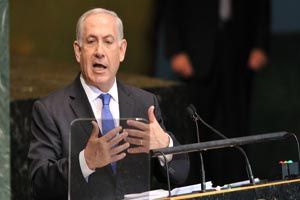Information from one of our readers posted
on our blog – October 7, 2012 –
If the Chugoku Electric Power Company’s
license expires, efforts of Iwaiija residents, who have fought to
protect the nature and fishing ground of Kaninoseki, will be paid off.
(Kaoru Shirai, Representative of Shanti Phula)
English translation of an excerpt from a
Japanese article: Mainichi JP (Mainichi Shimbun) – October 5, 2012 –
Kaminoseki
Nuclear Power Plant: Yamaguchi Prefectural Government Turns Down Chugoku
Electric Power Co.’s Request for Extension of License
Site where a Kaminoseki nuclear power plant
is planned to be built. In the right
back is Iwaijima island = Photo taken by Shinji Kako on a helicopter of Mainichi
Shibum’s head office, flying over Kaminoseki Town, Yamaguchi Prefecture
On 5th, Chugoku Electric Power
Co. applied to Yamaguchi prefectural government for a three-year extension of
license, which is necessary to reclaim land for Kaminoseki nuclear power plant
planned to be built in Kaminoseki town, Yamaguchi Prefecture.
On the same day, Economy, Trade and
Industry Minister Yukio Edano said that the Kaminoseki nuclear complex is “subject
to the principle of not constructing new reactors” and indicated the government’s
intention not to allow the utility company to start construction work. Chugoku Electric Power Co.’s application in
spite of the government’s decision showed its aspiration for construction. However, the prefectural government has a
stance not to allow license extension for the reason that “national energy
policy is indecisive.” The plan for
construction of a nuclear power plant may be practically dropped.
The license is due to expire at midnight on
7th of this month. The
prefectural government decides whether to accept the extension within 32 days
and during the time the license is effective.
On 5th Governor Shigetaro Yamamoto told reporters, “We cannot
approve it at this point. We will not
grand license.”
If the license expires, “The
reclaimed site has to be restored to its original state.” (Comment by an executive
official of Agency for Natural Resources and Energy) It is very difficult to put the plan into
action.
On 5th, with regard to Minister
Edano’s remarks, Kaminoseki Town Mayor Shigemi Kashiwabara said in a press
conference, “I don’t understand his real intention. He changes his opinions every day. I cannot trust his remarks unless I receive
official notification.” He showed
mistrust in Minister Edano. There are
voices in local communities and neighboring municipalities that “If a change of
government takes place, the use of nuclear energy is likely to gain momentum
again.”
With regard to Minister Edano’s remarks
about non-approval of construction, at first the person in charge of public
relations of the utility company emphasized that the company interprets the
remarks of Minister Edano as his personal opinion. In the afternoon press conference, reporters
asked Chief Cabinet Secretary Osamu Fujimura about the minister’s remarks for
confirmation. He refused to give his
comment, saying “I cannot answer it. I cannot
give a reason for it.”






